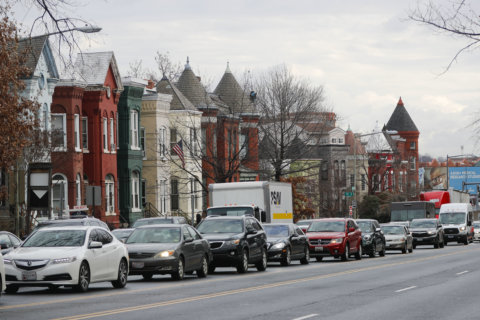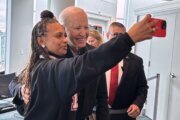In our three-part special report, Money On Our Minds, WTOP takes a close look at the financial situation of millennials in the D.C. area and how they make ends meet, with a focus on student loan debt, homeownership and retirement planning.
WASHINGTON — As college-educated, millennial workers flock to the D.C. area for job opportunities and higher salaries, they’re also hauling around a noticeable amount of student loan debt.
D.C. is No. 1 among U.S. cities with the highest median student loan balances at $22,803, according to data from Lending Tree. And around 10 percent of loan holders in D.C. owe over $100,000.
Kristen Shannon decided to move to D.C. in 2016 to cut down on her commute and be closer to her job. The 25-year-old has under $23,000 in loans left to pay after graduating from American University three years ago.
“I always try each month to pay a little bit over; I have the income-driven plan. I try to budget a little more so it covers more than the principal and gets into the interest,” she said.
This year, outstanding student loan debt across the U.S. has grown to $1.5 trillion, according to the Federal Reserve. About 1 in 4 adults under the age of 30 have student loan debt, and those with a bachelor’s degree owe a median of $25,000, the Pew Research Center found.

For those in their 20s who are starting out and making an entry-level salary in D.C., paying rent and having enough left over to have some fun once in a while is a tall order, said Dawn Leijon of American University’s Kogod School of Business. “You are struggling to stay afloat, to make ends meet,” she said.
Leijon is the lead researcher behind the school’s “Millennial Index,” a survey that looks into what factors attract millennials to the D.C. area.
To clarify, the U.S. Census Bureau does not have an official start or end date for the millennial
generation. But it has said that anyone born between roughly 1982 and 1998, falls into the millennial range. This year, the Pew Research Center definitively placed millennials as being born between 1981 and 1996. The center’s reasoning behind that particular range has to do with social, political and economic factors that affected millennials’ formative years, such as the 2008 financial crisis.
Although there are plenty of job opportunities in D.C. and the potential of earning a high salary can attract millennials, Leijon said the cost of living and student loans can quickly make huge dents in what they’re taking home.
Nearly 60 percent of those surveyed in the “Millennial Index” earning less than $50,000 a year say they’re living paycheck to paycheck; even for those earning between $50,000 to $99,000, nearly 60 percent surveyed said it’s still hard to make ends meet.
“Even among people who are making over $100,000 or even $150,000 a year, we have a lot of people who are not feeling good about their financial situation, living paycheck to paycheck and telling us, ‘I work hard, but I still can’t really get ahead,’” Leijon said.
Shannon now works as a program manager at a nonprofit organization in D.C. Oftentimes, she doesn’t feel like her paycheck goes very far.
“When I look at my paycheck, the first thing I do, ‘OK, rent, minus that, minus student loans,’” Shannon said. She’s also rethinking her cable bill.
While in school, Shannon’s financial aid was inconsistent. During her freshman year, Shannon said, she received a special grant that was supposed to be recurring. But by her junior year, she had to start taking out loans because “the grant just stopped without any warning,” she said.
She ended up taking out subsidized and unsubsidized federal student loans. But, she added, “My senior year, my mother actually took a loan from her life insurance, and we’re paying that off as well, so that’s the only ‘private’ loan we have, and that was really just for my senior year.”
Like other millennials, Shannon said she and her friends are still trying to figure out how to be financially independent, joking that they’re always talking about how broke they are or how much something costs.
“We’re all paying student loans and we’re all kind of in this … I wouldn’t even say middle class, like lower middle class. I don’t really know how to classify myself, but money is on our minds all the time,” she said.
Higher education, higher debt
Higher education is thought of as an investment that can potentially better someone’s financial future. College graduates earn 80 percent more on average than those without a degree, according to the Federal Reserve Bank of New York.
Even before the 2008 recession, student loan debt was already on the rise, said Gerald Daniels, assistant professor of economics at Howard University. And it’s affecting the financial decision-making of millennial households, especially if they’re younger or people of color.
“I do think that kids are taking out higher debt burdens for their education attainment that their parents didn’t have to. So this will delay other types of purchases,” said Daniels, who himself identifies as a millennial.
While the cost of college has increased, Daniels still believes that the return for getting a higher education is worth it.
But that larger price tag can also push those who can barely afford to go to college to take on a larger debt burden. “So they’re already starting out their lives in the hole in a way their parents or previous generations did not,” Leijon said.
“Millennials, unfortunately, are in a very bad financial situation. If you look at all the pressures — first of all, they came out of college, many of them into a recession, and there’s plenty of data that shows that when you start your career in a recession, your lifetime earnings will be less than it would’ve been if you came out in a healthier economy,” she added.
That effect on millennials’ pay can influence when they’ll be able to buy a home, whether they can afford to buy a car, pay for parking, and how soon they can pay off their student loans.
Just because older millennials in their 30s may have had more time to pay off their debt doesn’t mean their outlook is any rosier, said Jessica Lautz, director of demographics and behavioral insights at the National Association of Realtors.
“Those 37-year-olds, even though they have time on their side, they’re more likely to have graduated into a worse job market,” Lautz said. “So when we actually divide up younger and older millennials, those older millennials, actually, they’re a little more pessimistic if they do have student loan debt and they’re held back by it.”
And, Lautz added, those who are repaying their student loans believe that debt is delaying their homeownership process by several years.
After graduating, Shannon initially lived in her family’s home in Bowie, Maryland, before moving back to D.C. Now she lives in a Columbia Heights studio and pays just under $1,200 a month for rent.

Though she’s learned some financial lessons from her family, she said that she’s had to learn much about her student loans on her own, such as how to consolidate her loans to get a lower interest rate.
How to face student loan debt
Millennial personal finance expert Stefanie O’Connell said those who have student loans to repay need to be “proactive” instead of ignoring their debt. The key, she said, is to do something about your loans, whether it’s contacting your lender to work out the best repayment plan for your situation and always paying more toward the principal when you can.
For those with federal student loans, there are several repayment plans available such as the income-based plan, “pay as you earn” plan or a graduated-repayment plan.
Refinancing student loans to get a lower interest rate may be an option. However, that depends on a person’s credit and whether they have federal or private loans. Refinancing federal loans to a private loan will change someone’s eligibility for repayment plan options and public service loan forgiveness.
And if you’re considering a variable rate loan, the Consumer Financial Protection Bureau warns about possible interest rate increases.
Some employers may also offer help to workers paying off their student loans.
In June, the pharmaceutical company Abbott announced its “Freedom 2 Save” program to help build the retirement savings of full-time and part-time employees eligible for the company’s 401k who are paying off their student loans. Fidelity Investments has a student loan assistance program.
For Shannon, she said it’s frustrating to see older generations view millennials as “frivolous with their money,” as if just cutting out purchases of Starbucks and avocado toast will simply fix their financial situations.
“Just understanding the layers of privilege around who is a millennial — it’s not a blanket definition. There are a lot of articles where it’s like, you know, ‘I paid off all my student loans in three years,’ and then you come to find out that their dad is a board of trustee member, or the university gave them some type of lump sum money after they graduated — that’s not the common narrative,” she said.
“I never in my life felt like I had a safety net, and so that’s something that has been kind of scary,” Shannon added.
‘A growing problem’

If millennials had a bit more money, they’re likely to make smart investments and can actually be more financially savvy compared with previous generations, Leijon said. A Bank of America survey conducted last year found that 63 percent of millennials are saving.
“They have great intent financially, but they just don’t have the resources because they make too little for the costs that they’re dealing with,” Leijon said.
For millennials who are coming into their key earning years, they’re not seeing significant wage gains, said Tara Sinclair, an associate professor of economics at George Washington University.
And earning more could significantly help with repaying student loans, along with making rent, contributing to savings and other costs.
“What people really want is that they want to see that their paychecks are actually going to go further in terms of rent, in terms of going to the store and being able to buy things, and so what people really want to see is these inflation-adjusted or cost-of-living adjusted wage increases,” Sinclair said.
Policy, she said, may help in this case, such as putting pressure on companies to let their workers bargain more for pay and have more transparency about pay.
Earning a higher salary could be one of the solutions that keep millennials in the D.C. area, Leijon added.
“If they had another couple thousand dollars a year — $5,000, $10,000 — then they have a lot more cushion and they can start to do some of the things they want to do, or maybe live in a safer place, or feel a little better about their financial stress,” she said.
There is still more work to be done to reduce the racial disparities in wealth, Daniels added, especially with black graduates more likely to take on student debt and end up owing more than their white peers, according to research from the Brookings Institution.
In order to tackle student loan debt, clear policy changes need to happen, said Daniels, who also wants to see more seminars or programs at schools to train students on dealing with large debt burdens they might be taking on.
“It’s a growing problem that we need to address sooner than later,” he said.
In the next two pieces, WTOP takes a look at homeownership among millennials in the D.C. area and what the state of retirement planning is looking like for those in their 20s and 30s.
More from the Money on Our Minds special report:
- Part 2: Student loan debt, wealth divide harming millennials homeownership dreams
- Part 3: ‘I don’t know if what I’m doing is right:’ Millennials face barriers to retirement planning








